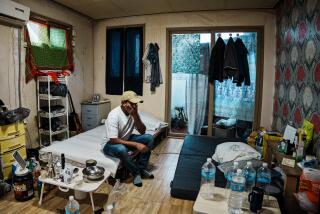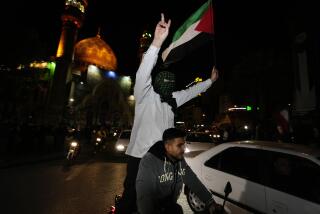Corruption Spotlight Now on Panama
Former Central American presidents increasingly are facing criminal prosecution for alleged corruption during their administrations. The latest in the cross hairs: Panama’s former chief executive, Mireya Moscoso.
The ex-president, who served from 1999 until September, and several of her Cabinet members and close associates face probes for alleged misuse or embezzlement of tens of millions of dollars in government and charitable funds.
Associates of current President Martin Torrijos say the investigations are the first of their kind since Panama reinstituted democracy after Manuel Noriega was overthrown by U.S. forces in 1989.
Anti-corruption movements are making headway across Central America. Former President Arnoldo Aleman of Nicaragua has spent two years under house arrest, initially on charges of money laundering and now amid the accusation that he misappropriated funds. Two former Costa Rican presidents, Miguel Angel Rodriguez and Rafael Angel Calderon, are awaiting trial for allegedly taking kickbacks from government contractors.
In Guatemala, investigators are pursuing a case against former President Alfonso Portillo, who lives in Mexico, for alleged misuse of government funds. A recent audit by the federal controller’s office found that $150 million budgeted during Portillo’s term, which ended last January, couldn’t be accounted for. Guatemala has asked Mexico and the U.S. for help in tracing Portillo’s bank accounts.
Why the newfound zeal? University of Panama professor and investigative journalist Tomas Cabal attributes it to rising public disgust with crooked politicos after decades of passivity and fatalism in the face of official corruption.
“There’s a growing intolerance toward officials feeding at the public trough,” Cabal said. “Impunity is no longer viable.”
Activist Angelica Maytin Justiniani concurs. Justiniani is president of the Panamanian office of Transparency International, a public interest group.
“Ten years ago, talking about corruption in high places was taboo,” she said. “Now the public is more aware of it and sees it as a problem that affects poverty and holds back progress.”
Torrijos took office in September after waging a “zero corruption” campaign and promised that his administration would adhere to principles of honesty and openness -- daring concepts in a region plagued by a history of illicit dealings by government leaders.
Now, the Panamanian leader is making that promise retroactive, launching a series of investigations aimed at his predecessor.
Upon leaving office, Moscoso was protected from prosecution by two claims to immunity, one for being president of a national political party and the other for her membership in the Central American Parliament. Torrijos successfully challenged the first claim in court and is working on striking down the second.
Cristobal Arboleda, executive secretary of Torrijos’ anti-corruption council, said fraud reached such a level under the Moscoso administration that it was impossible to ignore.
Among the half-dozen cases under investigation, the one that has drawn the greatest public scrutiny is Moscoso’s alleged misuse of $25 million in discretionary funds traditionally spent on emergencies such as natural disasters or on medical care for the poor. Moscoso has admitted spending millions of these dollars on expensive clothes and jewelry for herself and plastic surgery for presidential assistants.
“The president’s defense of those expenses was that it would hurt Panama’s image if she looked like a homeless person,” Maytin Justiniani said. “In a country where 40% of the population lives in poverty, buying yourself such luxuries with public money is a real insult.”
Also stirring public ire is the disappearance of a major portion of $70 million in charitable funds donated by the Taiwanese government, much of it to a fund called the Pacific Foundation, which was controlled by Moscoso.
A portion of the money went to build a new hospital and part to construction projects that included a new museum and the renovation of Panama’s Foreign Ministry offices. Investigators say the construction costs were overblown and suspect government officials of taking kickbacks.
Taiwan plays a major role in the Panamanian economy. A Taiwanese shipping concern operates a port at the Caribbean entry to the Panama Canal. The Asian country also regularly expresses its gratitude to Panama for being one of a handful of nations that grant it diplomatic recognition.
A scandal is also brewing involving bogus loans made by Panama’s national savings bank to as many as 111 “phantom” or fake trusts. The bank has said it may lose at least $45 million in questionable loans, although the figure could rise to surpass $100 million, say sources familiar with the investigation. The head of the savings bank during the period in question, Carlos Herbruger, was a Moscoso appointee and high-ranking member of her party.
“Norms were violated in making the loans,” said one investigator, adding that millions of dollars are unaccounted for. “They were not in the best interests of the savings bank.”
Bolivar Pariente, whom Moscoso appointed to head another financial institution called the Panama National Bank, is implicated in a real estate scandal centering on Prados del Este, a 480-unit project built in a former rice paddy that was damaged by September floods. Investigators say Pariente had a possible conflict of interest in approving a development loan, which has led to losses by the bank and hundreds of homeowners.
Moscoso’s defenders say the probes are politically motivated. In August, shortly before she left office, she earned the enmity of her successor by pardoning four prisoners who had been convicted of plotting to kill Cuban leader Fidel Castro during his November 2000 visit here.
She announced the pardon after the prisoners, three of whom were wanted on murder or terrorism charges in other nations, had already been released and left the country.
Circumstances surrounding the pardons are being examined, a high Torrijos government official said.
Moscoso’s attorney says the probes are the result of bad advice given to Torrijos.
“People around Martin Torrijos are doing what they think the president wants. All these claims are hurried and backed by falsehoods. They have started badly and will end up badly in terms of any kind of success for the prosecutors,” said Rogelio Cruz Rios, who represents Moscoso.
Others say the risks are considerable for Torrijos, son of the late former dictator Omar Torrijos. Martin Torrijos’ promise to root out corruption may have raised expectations impossibly high, they say.
“Angry masses in Bolivia and Ecuador got rid of presidents, and something like this could happen here if Torrijos doesn’t live up to his promises,” Cabal said. “If he doesn’t, he’ll hear the marching feet in the street.”
More to Read
Start your day right
Sign up for Essential California for news, features and recommendations from the L.A. Times and beyond in your inbox six days a week.
You may occasionally receive promotional content from the Los Angeles Times.






